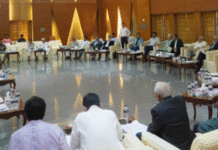
A Rohingya refugee collapses as he waits to receive aid in Cox’s Bazar on Sunday. — Reuters photo
Rohingyas, who entered Bangladesh fleeing recent violence in Rakhaine state of Myanmar causing the fastest and most urgent refugee emergency in the world, were still in urgent need of life-saving assistances like shelter, food, medication and sanitation till Sunday.
One month after the eruption of the violence, what the United Nations termed a textbook example of ethnic cleansing, a situation report released on Sunday by the UN and international agencies, estimated that 3.20 lakh Rohingyas were still in need of emergency shelter, 2 lakh needed food, 2.50 lakh needed sanitation and 3 lakh needed nutrition assistances.
Bangladesh government and international community continued struggling to cope with the situation as about half a million Rohingyas had already entered the country and many others were waiting in the borders making it one of the biggest humanitarian problems in the world.
In absence of required food causing malnutrition was making Rohingyas fragile and more vulnerable to a variety of diseases, said aid workers.
Bangladesh needs ‘massive international assistance’ to feed and shelter Rohingyas, UN high commissioner for Refugees Filippo Grandi said at a briefing in Cox’s Bazar after visiting Rohingyas on Sunday.
‘I was struck by the incredible magnitude of their needs. They need everything –– they need food, they need clean water, they need shelter, they need proper health care,’ he said.
Grandi said that there had been an ‘incredible outpouring of local generosity’ but that now needed to be ‘beefed up by massive international assistance, financial and material’, reported Agence France-Presse.
Grandi said that the scale of the influx –– which he called the ‘fastest and most urgent refugee emergency in the world’ –– had made it difficult to assess needs quickly. ‘I think that the response is getting more organised,’ he added.
The United Nations in a statement on Sunday warned of growing humanitarian needs amongst Rohingyas.
The UN resident coordinator in Bangladesh, Robert Watkins, said that one month on since the eruption of Rohingya crisis, there was an urgent need to continue scaling up humanitarian operations to meet the growing needs of the Rohingyas.
‘The UN and its NGO partners are working to support the Government to provide the refugees with life-saving assistance. The scale of the needs is immense, and we urgently need funding to rapidly increase the support we are providing,’ he added.
‘Rohingyas are a burden for us but if everyone comes forward, we will be able to face the humanitarian crisis we are dealing with for a month,’ disaster management and relief secretary Md Shah Kamal said, adding that the government and international agencies were trying to provide humanitarian assistance to the ethnic minority people fled from Myanmar.
UN agencies on Sunday said that about 4.36 lakh Rohingyas had entered Bangladesh since August 25.
Officials estimated that the influx already took to 8.56 lakh the number of Myanmar people living in Bangladesh.
The UNHCR and the IOM expressed fear that the new influx might take to 10 lakh the number of Myanmar nationals in Bangladesh by the end of the year.
The ongoing ethnic cleansing began on August 25, when Arakan Rohingya Salvation Army reportedly attacked dozens of police posts and checkpoints and one military base in Rakhine. The insurgent group, however, said that it made the attacks to pre-empt military attacks on Rohingyas.
Terrified, half-starved, exhausted Rohingyas arrived in Bangladesh in groups trekking through hills and crossing rough sea and the River Naf on boat and took shelter wherever they could in Cox’s Bazar and Bandarban.
Many Rohingyas took shelter at makeshift camps in reserved forests, felling trees, setting up shanties digging slopes of hills, some of then took shelter at overcrowded registered and unregistered camps.
Over half of the Rohingyas were children and infants who were crying for food. Thousands of them were victim to indiscriminate violence and were orphaned or separated from their parents.
‘Ensuring that children and families have safe water for drinking and washing is absolutely essential in order to protect them against diarrhoea and other waterborne diseases,’ said UNICEF representative in Bangladesh Edouard Beigbeder.
‘This is a very real threat given the current situation in the camps and makeshift settlements where the Rohingya are now living, especially amid the current heavy rains,’ he said in a statement on Sunday as first consignment of UNICEF emergency supplies arrived in Dhaka.
Relief works carried out by the government, international humanitarian agencies and local people were still not sufficient and their efforts to arrange temporary toilets were already in a mess and little water supply hardly helped the hapless Rohingyas to survive, said local people.
Health facilities in Cox’s Bazar are overcrowded with increasing patients suffering from fever, cold and cough, dysentery, diarrhea and malnutrition, said Cox’s Bazar civil surgeon Abdus Salam, adding that possibility of an outbreak of diseases remained in the beach town, one of the most visited tourist spot of the country.
Against this backdrop, the situation report prepared by Inter Sector Coordination Group, a coordinating body of the UN and international aid agencies, said that violence had driven an estimated 436,000 Rohingya across the border into Cox’s Bazar and Bangladesh. The speed and scale of the influx had resulted in a critical humanitarian emergency.
An estimated 320,000 Rohingyas were still in need of emergency shelter assistance, 199,000 people still required support to meet their food assistance needs, 300,000 people were in need of nutrition assistance and 249,930 still requires WASH assistance, said the situation report.
About 5.8 million food rations were required to meet people’s emergency food assistance needs; 59 million litres of safe water are needed every day to meet the needs of the target population and 18,000 latrines to provide access to basic emergency sanitation, said the situation report.
Cramped and crowded living conditions with lack of adequate water and sanitation were presenting significant risks of an outbreak of diseases. A total of 154,066 children under 5 and 54,633 pregnant and lactating women needed malnutrition prevention and treatment support through nutrition supplements.
A total of 14,420 severely acute malnourished children required inpatient and outpatient treatment, said the report.
Industries minister Amir Hossain Amu on Saturday said that the government had no intention to give refugee status to the Rohyingas.
The government would push back Rohingyas, he said while talking to reporters after presiding over a meeting of the cabinet committee on law and order.
Amu said that the government had kept police and administration on alert so that nobody could damage the religious harmony.
Inter Services Public Relation Directorate in a statement said that about 550 army personnel were assisting relief works among the Rohingyas by setting eight relief camps at Teknaf and Ukhia.
The statement also said that army was working on to prepare master plan and design of shelter house for Rohinagys.
Army continued its effort to provide treatment and sanitation facilities to Rohingyas.
Bangladesh government has allocated 2,000 acres of land at Balukhali and was building 14,000 sheds for Rohingyas. It has allocated 500 tonnes of rice and 36 medical teams are working for assisting Rohingyas. It also allocated Tk 40 crore for repairing and constructing roads and fencing of new camp at Balukhali.
Speaker Shirin Sharmin Chaudhury while distributing relief among Rohingays at Balukhali on Sunday urged Myanmar to implement the recommendation made by the Kofi Anan-led advisory commission on Rakhine state.
She also urged Myanmar to take back all Rohingays.
Source: New Age









